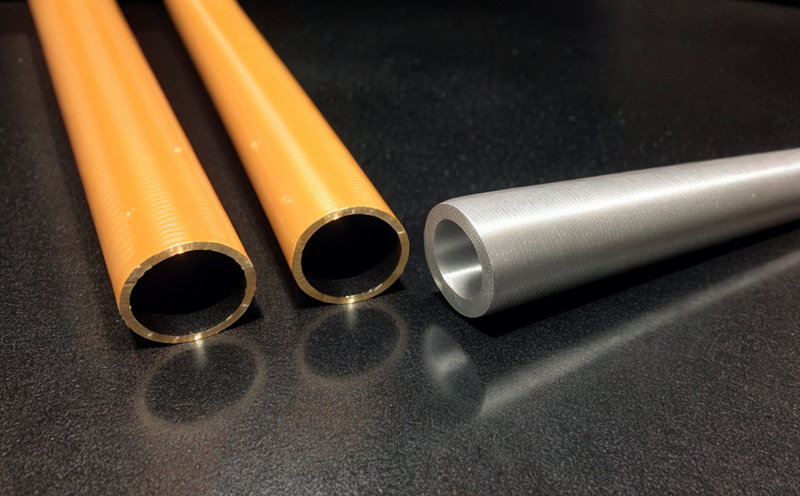EN 6083 Turbine Blade Composite Fatigue Testing
The European standard EN 6083 is a critical benchmark for ensuring the durability and reliability of composite materials used in turbine blades. This standard specifies procedures for conducting fatigue tests on composites intended for use in aircraft engines, where the components must withstand extreme stresses over thousands of cycles.
This type of testing is essential for aerospace and aviation industries as it directly impacts safety and performance. The material properties of composite turbine blades are subject to cyclic loading during operation, which can lead to micro-cracking or failure if not properly designed and tested. EN 6083 provides a standardized approach to evaluate the fatigue strength of these materials under controlled laboratory conditions.
The testing process involves preparing specimens according to specified dimensions in accordance with EN 6083 requirements. These specimens are then subjected to cyclic loading using specialized fatigue testers that replicate operational stress environments as closely as possible. The goal is to determine the number of cycles before failure occurs, known as the fatigue life.
During the test, engineers monitor critical parameters such as strain rates, temperature variations, and applied loads to ensure accurate results. Post-test analysis includes visual inspections for surface cracks and detailed examination using advanced imaging techniques like X-ray or ultrasonic testing. Compliance with EN 6083 ensures that manufacturers can demonstrate adherence to industry standards and regulations.
The importance of this test cannot be overstated given the high-stakes nature of aerospace engineering. A single failure in a turbine blade could lead to catastrophic consequences, underscoring the necessity for rigorous quality control measures like those outlined in EN 6083.
For R&D engineers and compliance officers looking to ensure their products meet these stringent requirements, Eurolab offers comprehensive services including specimen preparation guidance, state-of-the-art testing facilities, and thorough reporting tailored to meet specific client needs. By leveraging our expertise and facilities, you can rest assured that your composite materials will undergo the most rigorous testing available.
Scope and Methodology
The scope of EN 6083 turbine blade composite fatigue testing encompasses several key aspects. Firstly, it defines the types of composites that should be subjected to this type of evaluation, focusing on those used in critical structural components such as turbine blades. Secondly, the standard outlines precise protocols for specimen preparation, ensuring uniformity across all tests conducted.
The methodology itself involves subjecting these specimens to cyclic loading using fatigue testing machines capable of simulating real-world operating conditions. The test setup typically includes environmental controls like temperature and humidity regulation, which are crucial given the diverse operational environments experienced by aircraft engines.
Throughout the testing process, continuous monitoring is conducted on various parameters including stress levels, strain rates, and any observable changes in material properties. This data collection allows for real-time adjustments to ensure accurate results while also providing valuable insights into how different factors influence fatigue performance.
After completing the prescribed number of cycles or reaching a predetermined threshold where failure occurs, thorough post-test analyses are performed. This includes visual inspections for visible cracks and more advanced techniques like X-ray photography or ultrasonic testing to identify internal defects not apparent through simple observation alone.
The methodology described in EN 6083 ensures consistency across all tests conducted according to this standard, thereby enhancing reliability and comparability of results. Compliance with these stringent requirements is essential for manufacturers aiming to meet both regulatory standards and industry best practices.
Eurolab Advantages
- State-of-the-Art Facilities: Our laboratories are equipped with advanced testing equipment designed specifically for conducting EN 6083 turbine blade composite fatigue tests. This includes high-precision fatigue testing machines capable of replicating real-world stress conditions.
- Experienced Technicians: Our team comprises highly skilled professionals who have extensive experience in performing these types of tests. They are well-versed in adhering to the latest international standards and can provide valuable insights throughout your project lifecycle.
- Comprehensive Reporting: We offer detailed reports that not only summarize test results but also interpret findings within the context of EN 6083 requirements, helping you understand what these outcomes mean for your product's performance and safety.
- Dedicated Client Support: From initial consultation through final analysis, we are committed to providing personalized support tailored specifically to your unique needs. Our goal is always to deliver services that exceed expectations while ensuring compliance with all relevant regulations.
International Acceptance and Recognition
The European standard EN 6083 has gained widespread acceptance across various sectors, including aviation, defense, and aerospace industries worldwide. Its rigorous testing procedures have earned it recognition not only in Europe but also internationally.
- United States: Many American manufacturers who supply parts for aircraft engines comply with EN 6083 standards due to their stringent requirements ensuring safety and reliability.
- Canada: The Canadian aviation industry also recognizes the importance of adhering to these standards when producing components like turbine blades.
- Australia: Similarly, Australian regulatory bodies consider compliance with EN 6083 essential for certifying products destined for use in commercial and military aircraft operations within their airspace.
- New Zealand: New Zealand's stringent safety regulations require adherence to international standards like EN 6083 when importing or exporting composite materials used in turbine blade manufacturing.
By ensuring that your testing processes align with EN 6083, you demonstrate a commitment to maintaining high-quality standards that are recognized and respected globally. This can help enhance market credibility and potentially open doors to new international markets.





